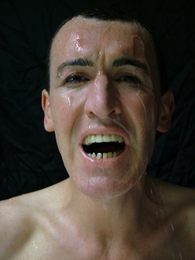The miscellanies of old age and poor mental health are not the easiest or most attractive subjects to entice audiences. Fishamble, a theatre company known for its uptake of novel and challenging work, takes these two subjects in two separate plays, back to back over two nights, and in two eighty minute one man performances, Pat Kinevane delivers a choreographed journey into the frailty of body and mind. The performances are quite haunting and delivered by Kinevane in a fusion of dance and monologue that blend into a kind of theatrical extravaganza, engendering superb audience appreciation. Kinevane, writer and performer of both shows, unleashes the past and present lives of his characters, all of whom have arrived at vulnerable and frail states.
Forgotten deals with being old, while Silent charts one man's descent into the hole of chronic long term depression. Kinevane sees himself as more a performer than a writer and as the former he is astonishing, but his penned treatment of his subject material in these plays is exhaustingly well observed, humane, funny and enlightening. Forgotten has toured quite extensively over the last four years and Silent is his latest offering, this tour its first outing.
 Forgotten explores old age from the perspectives of Flor, Dora, Gusts and Eucharis, all aged between eighty and one hundred years, living in care homes that have varying levels of standards ranging from awful to extremely comfortable. Kinevane’s arrival on the stage in a Japanese kimono against the backdrop of a glowing red setting sun evokes an exotic exuberance that initially shields the subject of the performance that ensues. Quickly dispensing of the kimono, he reveals a taut body in a loincloth and in this guise he seductively delivers, through dance and monologue, the stories of the four protagonists, intermittently donning the clothes of their old age. It is quite a surprise when he first reveals the story of the aged Flor who is in a home “somewhere in the arsehole of Limerick.”
Forgotten explores old age from the perspectives of Flor, Dora, Gusts and Eucharis, all aged between eighty and one hundred years, living in care homes that have varying levels of standards ranging from awful to extremely comfortable. Kinevane’s arrival on the stage in a Japanese kimono against the backdrop of a glowing red setting sun evokes an exotic exuberance that initially shields the subject of the performance that ensues. Quickly dispensing of the kimono, he reveals a taut body in a loincloth and in this guise he seductively delivers, through dance and monologue, the stories of the four protagonists, intermittently donning the clothes of their old age. It is quite a surprise when he first reveals the story of the aged Flor who is in a home “somewhere in the arsehole of Limerick.”
Brazenly and somewhat erotically, through a beautiful physicality in dance (Kinevane cites Japanese Kabuki Theatre as being an inspiration), Kinevane wraps his serious and sad material in a moving, flowing stream of drama that is sewn together with fragmented narratives from his characters’ lives. The narrative flow is often stymied as he abruptly leaves a chapter in one life to dance into the chapter of another, revealing in vignettes by the end of the performance the paths they have taken and the destinations they have reached. But if the narratives are abruptly ended, the precision and poise of Kinevane’s choreographed movement excuse this and imbue the play with balletic tension. His performance is mesmerizingly evocative with a raw seductiveness as it juxtaposes the virility of youth against the decrepitude of age. It is thrilling performance theatre that takes the audience to dizzying heights, arrives at a cliffhanger, and soars off into another life to do the same all over again.
Silent utilises a similar style but Kinevane tones down the physicality here; while dance is again central to the performance, the story is more dependant on narrative and the cacophony of sound as he delves into the mental torture of a man shackled by depression. Examining the travails of Tino McGoldrig, a Cork born man living rough on the streets of Dublin, Silent traces the path of his life to a place of vulnerability and explores how hope and promise evolve into despair, quite cleverly glancing at the inadequacy of organisations and  support systems out there for individuals in poor mental health, such as the TV advertising campaign that tells people how important their mental health is and “to look after yourself.” If you are in poor mental health, “how can you look after yourself?” Kinevane poses. He explodes an array of irreverent gags at mental health hotlines that you guiltily have to enjoy, such as “If you are obsessive, compulsive, press one repeatedly.” There are lots of poignant observations woven of humorous jibes throughout the play and they serve the material well, sending valid messages about the reality of poor mental health. While Silent is certainly a documentary on the inadequacies of organisations and systems to deal with the most shattered of minds - it is full of warnings and messages - Culleton’s rather unbridled directorial approach (there is a sense that Kinevane needs but little reigning in both these plays and that the collaborative director/performer relationship is more rooted in suggestion than strict direction) and Kinevane’s consummate skills as writer and performer unburden the performance from becoming overly proselytising. Kinevane has an extremely acute, innate and intuitive sense of comedy that enable him to tightrope across the gross and heartbreaking circumstances of life, in jest without sacrificing the poignant sadness of a given predicament.
support systems out there for individuals in poor mental health, such as the TV advertising campaign that tells people how important their mental health is and “to look after yourself.” If you are in poor mental health, “how can you look after yourself?” Kinevane poses. He explodes an array of irreverent gags at mental health hotlines that you guiltily have to enjoy, such as “If you are obsessive, compulsive, press one repeatedly.” There are lots of poignant observations woven of humorous jibes throughout the play and they serve the material well, sending valid messages about the reality of poor mental health. While Silent is certainly a documentary on the inadequacies of organisations and systems to deal with the most shattered of minds - it is full of warnings and messages - Culleton’s rather unbridled directorial approach (there is a sense that Kinevane needs but little reigning in both these plays and that the collaborative director/performer relationship is more rooted in suggestion than strict direction) and Kinevane’s consummate skills as writer and performer unburden the performance from becoming overly proselytising. Kinevane has an extremely acute, innate and intuitive sense of comedy that enable him to tightrope across the gross and heartbreaking circumstances of life, in jest without sacrificing the poignant sadness of a given predicament.
Against Denis Clohessy’s extravagant sound design – coins hitting the bottom of a jar, the shuffle of feet on a pavement and a jumble of memories recalling events of McGoldrig’s life – Kinevane goes right under the skin of his character and inhabits him through the life he has now, the good adult life he gained and lost, and the earlier life of his challenging growing years. Emerging from beneath an old brown blanket on a bare stage and warning us that “If anybody asks, I am not here,” his performance goes on to reconstruct the major events in McGoldrig’s life and to unveil the triggers that led him from being a man of means to a man on the streets. The threadbare brown blanket doubles as McGoldig’s dancing partner when his married life is revealed and here we are again treated to Kinevane’s ingenuity as he dances with and brings to life the form of a woman in the inanimate blanket.
To see both Forgotten and Silent back to back over two nights is a real treat; their shared theme of loss is magically explored by Fishamble and Kinevane.
Breda Shannon is a freelance writer and reviews books for The Irish Examiner.